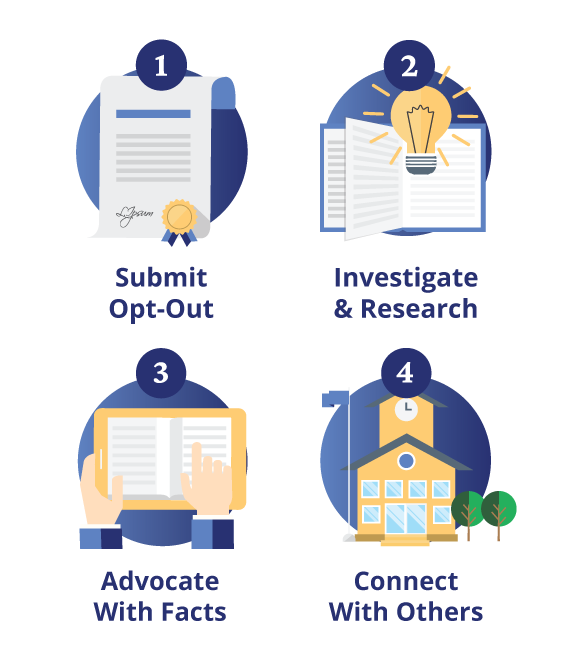Part 3
Applying What You Have Learned To Protect Your Children
If you are interested in applying this information individually or with others in your community, here are some ideas to get you started.

Submit a Parent Opt-Out of Specific Instructional Materials and Content
- Parents can submit an opt-out based on parental rights, the right to free exercise of religion, and the right to freedom of speech, and others, which are guaranteed under the federal and state constitutions. To see a blank sample opt-out, go to Appendix A in the book.
- If state school laws or state and local rules recognize parents’ right to opt out (i.e., data-sharing, surveys, physical and psychological exams, and sex education, to name a few), that is just more reason for the opt-out to be recognized by the school.
- Perhaps you and like-minded parents can submit an opt-out together for added support.
- If you are not sure whether you need an opt-out, submit an open records request regarding all of the instructional material and content that he or she receives.
Research and Investigate
- Knowledge is power. Investigate what is being taught in your children’s school.
- In the book at Appendix C, you will find the state laws, rules, rights, for all 50 states, as well as a link to each state bar (if necessary).
- Research your state school laws and your state and local board rules, which govern curriculum content, maximum class sizes, teacher certification, school discipline, class withdrawals, school athletics, teacher and administrator salaries, physical and psychological examination, vaccinations, medical treatments, data-sharing and surveys, to name a few.
- Research whether your state gives an exemption to schools, school libraries and/or public libraries to the state’s criminal obscenity laws. Obscenity laws make it a crime for an adult to show a minor (usually under 18) material that the law defines as “obscene” or “material harmful to minors.” Yet, the vast majority of states give exemptions to schools, school libraries and/or public libraries. This is how public schools are allowed to show this material to students. The obscenity laws and exemptions are listed for each state in the book at Appendix C.
- Research the many federal and state constitutional rights that apply to parents and students in public school K-12, such as the state right to a public education. Additionally, there are federal and state parental rights, the right to free exercise of religion, the right to free speech and the concomitant right not to be required to speak, and the public forum doctrine, which allows the government to regulate some speech depending on the type of “forum” involved such as a public school or a school board meeting. There are additional rights that may also apply, such as the right to due process.
Advocate with Facts Before Your State and Local Boards
- Advocate after you research your state’s open meetings laws.These laws govern state and local school board meetings, agendas, public comment, the right to video the meeting, and enforcement of the state’s open meetings laws, etc.
- Many local and state board members agree with the citizens who elected them but are either outnumbered on the board or are unsure of local support on tough issues.
- If the board member agrees with you, support him or her on the day of the vote. You may even want to speak in support of the issue.
- If the board member disagrees with you, try to understand the reasons for their position as well as the board dynamics. You can always persuade the board member to take a different position. Never threaten. Always be respectful.
Connect with Others
- Form a group to research and investigate together.
- Learn the power of cooperation.
- Numerous groups have information on protecting children in public schools. These groups take stances on many school-related issues. As a result, you may agree with 80% of what one group supports, 70% of what another supports, and 60% of another. Nonetheless, I encourage you to connect with others and learn about the issues that concern you. If you wait to find a group that you agree with 100% on school-related issues, you may have trouble finding one. Plus, your knowledge of how to protect children in public schools will be limited.
